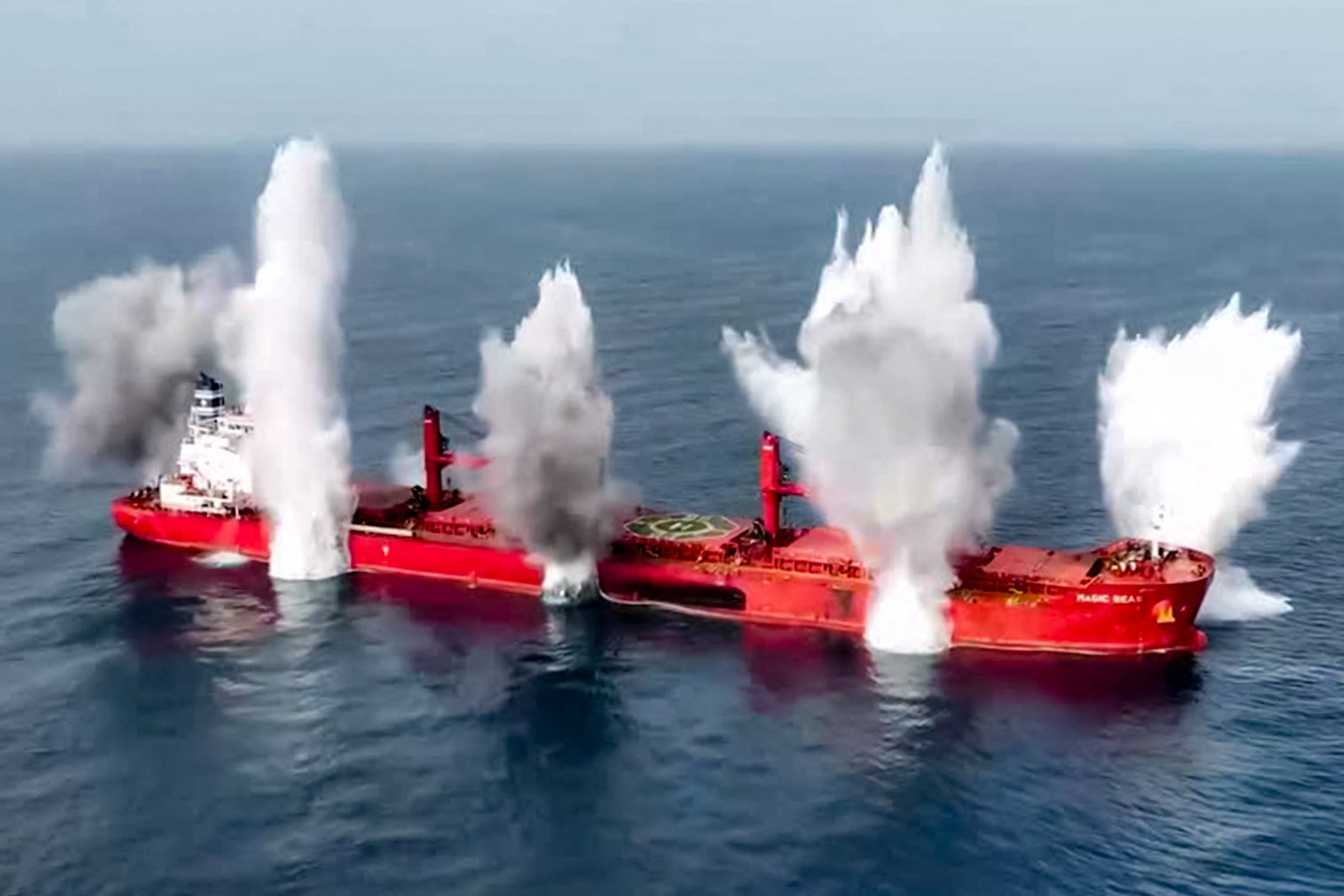
Red Sea Crisis Deepens: Houthis Sink Greek Cargo Ship, 15 Crew Missing
The Red Sea has erupted once again into a dangerous frontline for maritime shipping. This week, Houthi militants struck and sank the Eternity C, a Liberian-flagged cargo vessel operated by a Greek company, in one of the deadliest maritime attacks since hostilities flared in the region. The incident leaves 15 crew members missing and at least four confirmed dead, while only six have been rescued after spending more than 24 hours in the water.
The attack marks the second sinking of a commercial ship in just a few days, following the downing of the Magic Seas under similar circumstances. Both vessels were reportedly targeted due to their links to Israel — ties that may include past port calls — as the Iran-aligned Houthis revive a campaign of maritime assaults under the guise of support for Palestinians.
A Coordinated, Multi-Day Attack
According to maritime security sources, Eternity C was first attacked on Monday afternoon with sea drones and rocket-propelled grenades launched from Houthi-operated speedboats. The assault damaged critical systems and destroyed lifeboats, leaving the vessel drifting and severely compromised. On Tuesday, the ship was struck again by additional sea drones, forcing the crew and onboard security personnel to abandon ship. The Eternity C ultimately sank early Wednesday morning off the coast of Yemen.
Crew Casualties and Hostage Fears
The vessel carried a crew of 25: 21 Filipinos, one Russian, and three armed guards — including nationals from Greece and India. As of now, only six individuals have been rescued. Four fatalities have been reported, and the fate of the remaining 15, including some believed to be taken hostage by the Houthis, remains uncertain. A U.S. diplomatic mission in Yemen accused the Houthis of kidnapping some survivors and demanded their immediate and unconditional release.
A video released by Houthi media claims to show the attack, including what is said to be a radio call from Yemeni forces urging the crew to abandon ship before explosions rock the vessel. While Reuters was unable to independently verify the footage, the sinking has been confirmed by the EU’s Aspides naval mission and Greek-based maritime security firm Diaplous, which is involved in the search and rescue efforts.
Industry Alarm and International Outcry
These back-to-back attacks are reigniting global concern over the safety of one of the world’s most critical maritime corridors. The Red Sea, particularly the Bab al-Mandab Strait at its southern end, is a vital conduit for global oil and container shipping. According to Lloyd’s List Intelligence, vessel traffic through the strait has dropped sharply over the past week — from 43 ships on July 1 to just 30 by July 8. The renewed violence has also pushed oil prices to their highest point since late June.
The industry has responded with alarm. In a joint statement, the International Chamber of Shipping and BIMCO condemned the attack on Eternity C, calling it a “callous disregard for the lives of innocent civilian seafarers” and demanding stronger international action to protect shipping lanes and crews.
The vessels targeted this week both flew the Liberian flag and were operated by Greek companies with known commercial links to Israeli ports. While it’s unclear whether those links directly led to the attacks, the trend suggests that ship histories are now being scrutinized by Houthi operatives as part of their targeting strategy.
The sinking of the Eternity C also casts doubt on the effectiveness of the informal ceasefire between the United States and Houthi leadership announced in May, under which the U.S. paused its bombing campaign in exchange for a halt to maritime attacks. Houthi leaders have since stated that the deal did not include Israeli-affiliated vessels — a distinction that, if accurate, renders the agreement all but moot for most of the commercial fleet.
Diplomatic Ripples and Operational Risks
For Greece, whose shipping firms account for a significant share of global tonnage, the incident has triggered diplomatic engagement with Saudi Arabia and other regional stakeholders. Meanwhile, maritime security operators continue their efforts to locate the missing crew amid growing concern that this may not be the last high-profile attack this season.
As the international community weighs its response, the message for the maritime sector is chillingly clear: the Red Sea is no longer a contested zone — it’s an active threat theater. With increasingly sophisticated tactics, targeted profiling, and the re-emergence of hostage-taking, the Houthis have shown that their maritime campaign is far from over.
Now, as the search continues and families await word on their missing loved ones, the global shipping industry must once again contend with the realities of operating in hostile waters.
For tailored assistance and end-to-end support, contact us at enquiries@priavosecurity.com.
